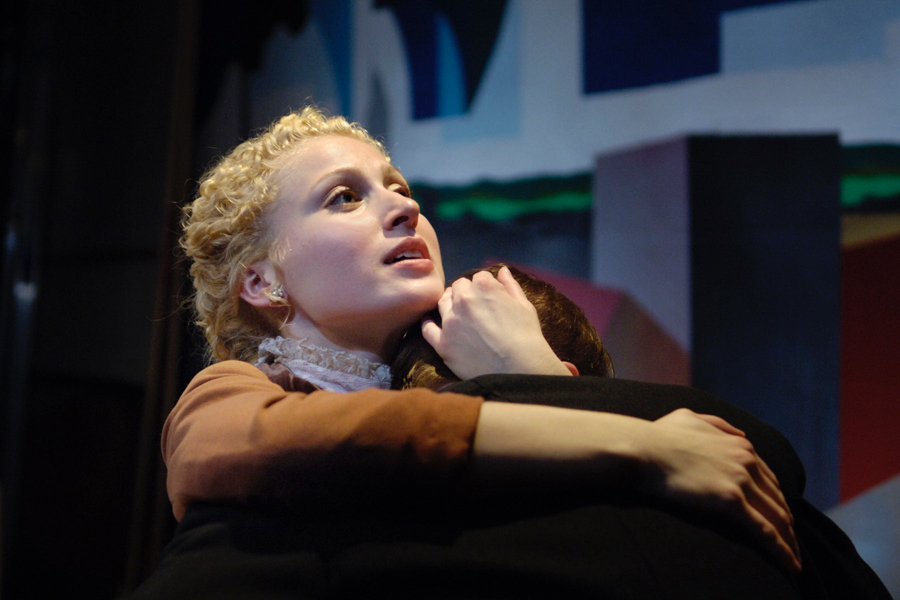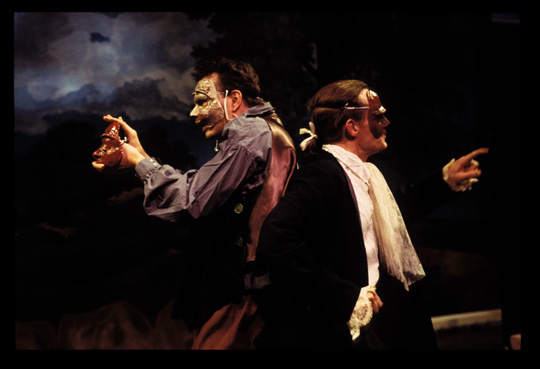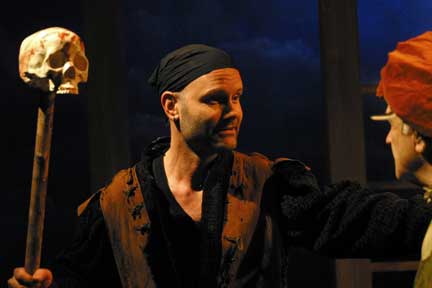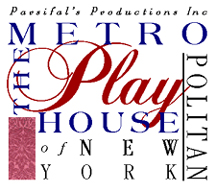Vision
Under the leadership of
Artistic Director Alex Roe since 2001, the 27-year-old
company has grown into an institution recognized
for both artistic excellence and cultural
significance. Guiding the company’s growth has
been a clear vision of the rich portrait that theater
paints of the culture that creates it. Reflecting
society’s values, aspirations, and character, theater
offers an especially rich perspective. On the one
hand, it is a window into the character of the time of
its creation. On the other, it is always contemporary, because
every performance of a play is a new creation for its
own time. Connecting us with our past in the light
of our present, America’s theater gives invaluable
insight into our cultural identity.
Repertoire
The Playhouse presents
fully staged productions and workshop presentations from
August through June. Through this work, the
company has revitalized and re-examined many forgotten
gems in the plays and literature of America’s
past. Metropolitan has also developed many new
plays that address America’s eclectic history and
culture. Focusing on what is it to be American,
what our culture is in the world, and what we
may see in the future, Metropolitan stages both old and
new works for the modern stage to get to the heart of
their lasting impact and import.
 Heritage
Mainstage Heritage
Mainstage
The core of Metropolitan
seasons are four mainstage plays, chosen individually
for their dramatic worth, intellectual sophistication,
social significance, and emotional depth. Through this
programming, the theater creates excellent productions
that challenge and entertain our audiences, as well as a
deeper exploration of our culture and identity as one
theme is seen through different perspectives. These
plays are typically rarely-produced American plays from
the past; new plays inspired by cultural trends or
historical periods of moment in our country’s past; and
occasionally, plays from other cultures that resonate
particularly with American culture or canonical
works. Each season is organized around a seasonal
theme that unifies the whole season and relates it to
the current cultural moment. Past themes have
included “Heroes,” “Outsiders,” and “Faith.”
East Village Theater Festival
Metropolitan’s East Side
Projects are now combined in to one annual festival of
brand new short works that celebrate the history and
people of the theater’s neighborhood: East Village
Chronicles is a new collection of plays each year
commissioned from local playwrights and inspired by the
history of the Lower East Side; Alphabet City is an oral
history series of solo-performances written by their
performers and derived from first-person interviews with
local residents. Each June, we conclude our season with
the East Village Theater Festival, featuring both of
these programs.
Living
Literature
Festival
The annual
“Author-fest,” in which we use our home theater to
present new pieces, created by other companies or
individual artists, and inspired by the life and/or work
of an American author. Past festivals have celebrated
Edgar Allan Poe, Mark Twain and artists of the Harlem
Renaissance.
 Family
Fare Family
Fare
In 2007
the company inaugurated a program of performances for
children and families. Making use of the theater
on otherwise empty weekend mornings, these programs
involve our local community as none of our other
programming can, and they help introduce very young
Americans to live theater.
History
The Playhouse opened the
doors to its first performance in 1993, and it has
plunged deep into the American experience in each of
its seasons since. The company’s first seasons
offered such articulate works as Shirley Lauro’s Open Admissions,
Arthur Miller’s The
American Clock, and a new stage adaptation of
Oliver Haley’s Round
Trip.
In
1997, the company moved into a newly renovated performance
space in the Cornelia Connelly Center on E. 4th Street, in
the heart of New York’s historically and culturally rich
Lower East Side. Here, the theater created a
beautiful, intimate, three-quarter thrust theater designed
particularly for our up-close, involving performances.
In that year, the
theater turned its attention to discovery of America’s
theatrical history as well, inspired by the prior
season's production of Dion Boucicault’s 1857
drama The Poor of New
York. The play was a signal artistic and
critical success, but it had been largely unknown and
seldom performed play. And it is only one of numerous
plays born in one of the busiest and most eclectic body
of work in world theater history—America’s at the turn
of the century—that have been largely overlooked.
In the years since,
Metropolitan has revived many forgotten gems,
re-investigating them, challenging them, invigorating
them for the modern stage without losing their period
impact and import. We have captured the particular American
spirit and theatrical magic of plays such as Belasco’s The Return of Peter Grimm,
Eugene Walter’s The
Easiest Way, and William C. DeMille’s The Woman, Clyde
Fitch’s The City,
and Percy MacKaye’s The
Scarecrow, and adapted the work of seminal American
literary voices such as Herman Melville and the writers
of the Harlem Renaissance.
Now, Metropolitan is a
pioneer in the frontier of the American experience. Each
season is an expedition, and each production seeks out
what it is to be American. Who are we? Where do we come
from? What is America in the world?
 The Future The Future
Over
the
past
several
years,
the
company
has
developed
a
dynamic,
contemporary
artistic
identity,
and it has strengthened the bonds between the theater’s
work and the residents of the theater’s home neighborhood.
With high profile attention in both local and national
media, a long track record of excellent productions and
notices, and an annual repertoire that continues to bridge
America’s cultural past with its present, Metropolitan now
has an unprecedented opportunity to achieve lasting
significance in the New York Cultural arena.
Selected Production History
Rediscovered Plays
|








